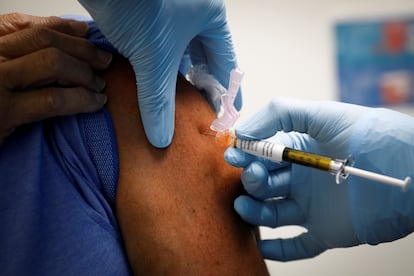Why wealthy Mexicans are getting vaccinated against Covid-19 in the US
With the inoculation drive in Mexico hampered by delays, desperate residents of San Pedro Garza García – the wealthiest city in Latin America – are traveling to Texas and Florida to receive the jab

It’s more than an open secret; it’s the main topic of conversation on instant-messaging chat groups – at least among the residents of San Pedro Garza García, the wealthiest city in Mexico and Latin America. These residents are spending their days asking for and sharing information about where they can get vaccinated against Covid-19 in the United States. Most of them are over the age of 60, meaning they are vulnerable to the virus, but not all of them. In San Pedro Garza García, everyone seems to know someone who has been vaccinated in a city in Texas or Florida.
The situation is the product of a mix of desperation, urgency and wealth. The city is located in the state of Monterrey just 250 kilometers from the US border, and is the headquarters and birthplace of some of the largest companies in Mexico, such as Cemex, the third-largest cemetery producer in the world, and the multinational conglomerate Alfa. In San Pedro Garza García, thousands of people have the economic means to pay for the coronavirus test required to enter the US, the cost of the journey, staying at a hotel and renting a car to line up outside an open vaccination site. And that is exactly what they are doing.
One such case is Mauricio Fernández, the former mayor of San Pedro Garza García. The 70-year-old, who is also an ex-senator and holds stock in some of the large companies in the city, shared on social media that he was able to get vaccinated in Los Fresnos in Texas, while traveling with friends to a beach in the US state. By consulting the websites of counties and nearby towns in Texas, Fernández and his friends found out that vaccines were available. Some places required people to register in line, others to collect a voucher in person with the date of the next available vaccination. But in some cases, you could try your luck just by waiting outside a designated vaccination site.

“They just told you that those in the line who were older than 65 were going to get vaccinated,” explains Fernández by phone from San Pedro Garza García. Fernández used his Mexican passport as ID and was vaccinated. “It’s very generous that the Americans could include everyone who was in the line, undocumented migrants, Mexicans, whoever. They weren’t saying ‘this person yes and this person no,’” he adds.
The flow of foreign nationals getting vaccinated in Texas is so great that residents in the state – who are still waiting their turn – are starting to get frustrated. But Marc Boom, the CEO of Houston Methodist, a local hospital system in the Texan city, said it is not a major problem. Speaking to the KPRC 2 television station, he explained: “If a few have fallen through the cracks, that is hardly the largest issue that we are dealing with.” The media also raised the issue with the governor of Texas, Greg Abbott, who responded in a video message to the Channel 5 News, on the KRGV TV network, by saying: “Texas vaccines are for Texas residents.”
San Pedro Garza García has a very close relationship with the United States, in particular with Texas, says Miguel Treviño, the current mayor of the city. “We are not only geographically connected, but also culturally and through family and friendships,” he explains. “It is a municipality where there is even a large number of people with US nationality or residency. So all these links that form part of the community open up the possibility of getting vaccinated in Texas, which has indeed happened.”
They just told you that those in the line who were older than 65 were going to get vaccinatedMauricio Fernández, former mayor of San Pedro Garza García
It is a luxury that few in Mexico can afford. In San Pedro Garza García, the gross domestic product (GDP) per capita is $50,935 (€42,688), and according to a 2020 report by US credit ratings agency Fitch Ratings, it has the highest income of all Latin American cities. It was here that the first cases of the coronavirus in Mexico were reported. Residents from San Pedro Garza García had traveled to Colorado on a ski trip, and returned with the virus, which was why Hugo López-Gatell, Mexico’s undersecretariat of health, said in June that the disease “was imported by social groups with high economic, financial capacity, the wealthiest social groups in the country.”
Fernández says that the city’s residents are looking to get vaccinated in the US out of necessity. The vaccination drive from the administration of Mexican President Andrés Manuel López Obrador is being rolled out slowly due to delivery delays of the Pfizer-BioNTech Covid-19 vaccine. What’s more, the campaign has been criticized for not being transparent about who was to receive the vaccine first. In a controversial move, López Obrador said that the “nation’s servants” – a group of around 30,000 people who promote the government’s social programs – should receive the first doses, given that they would be taking part in the vaccination drive in remote sites in Mexico.
The Mexican government launched a webpage this week to allow over-65s to register for the vaccine, even though the country does not yet have the doses to vaccinate this group. But the webpage itself is having problems, with users receiving error messages when they try to access it. “What I’m seeing here is that they don’t give a shit, no one has the wits to solve this problem, neither on a local or national level,” says Fernández, who hopes to be elected mayor this year.
Treviño, meanwhile, says that among the residents of San Pedro Garza García “there is a little bit of desperation with respect to the lack of organization and clarity that they are seeing from the federal government. On the one hand, this is something we understand, but we as a municipality have to coordinate [with authorities], above all we have to recognize that the authorities when it comes to health are the Mexican government and the state.”
English version by Melissa Kitson.
Tu suscripción se está usando en otro dispositivo
¿Quieres añadir otro usuario a tu suscripción?
Si continúas leyendo en este dispositivo, no se podrá leer en el otro.
FlechaTu suscripción se está usando en otro dispositivo y solo puedes acceder a EL PAÍS desde un dispositivo a la vez.
Si quieres compartir tu cuenta, cambia tu suscripción a la modalidad Premium, así podrás añadir otro usuario. Cada uno accederá con su propia cuenta de email, lo que os permitirá personalizar vuestra experiencia en EL PAÍS.
¿Tienes una suscripción de empresa? Accede aquí para contratar más cuentas.
En el caso de no saber quién está usando tu cuenta, te recomendamos cambiar tu contraseña aquí.
Si decides continuar compartiendo tu cuenta, este mensaje se mostrará en tu dispositivo y en el de la otra persona que está usando tu cuenta de forma indefinida, afectando a tu experiencia de lectura. Puedes consultar aquí los términos y condiciones de la suscripción digital.









































